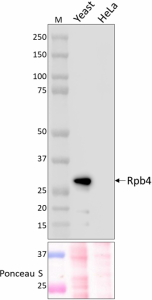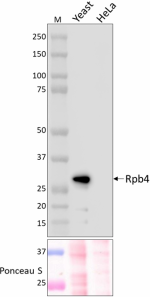- Clone
- 2Y14 (See other available formats)
- Regulatory Status
- RUO
- Other Names
- B32, DNA-directed RNA polymerase II 32 kD polypeptide, RNA polymerase II subunit B4
- Isotype
- Mouse IgG1, κ
- Ave. Rating
- Submit a Review
- Product Citations
- publications

-

Whole cell extracts (15 µg protein) from S. cerevisiae cells were resolved by 4-12% Bis-Tris gel electrophoresis, transferred to a PVDF membrane, and probed with 0.25 µg/mL (1:2000 dilution) of purified anti-RNA Polymerase II Rpb4 antibody (clone 2Y14) overnight at 4°C. Proteins were visualized by chemiluminescence detection using HRP goat anti-mouse IgG antibody (Cat. No. 405306) at a 1:3000 dilution. Direct-Blot™ HRP anti-GAPDH antibody (Cat. No. 607904) was used as a loading control at a 1:25000 dilution (lower). Lane M: Molecular weight marker.
| Cat # | Size | Price | Quantity Check Availability | Save | ||
|---|---|---|---|---|---|---|
| 665105 | 25 µg | 101 CHF | ||||
| 665106 | 100 µg | 253 CHF | ||||
Polymerase II (Pol II) is the central component of the basal RNA polymerase II transcription machinery. It is composed of mobile elements that move relative to each other. RPB4 is part of a subcomplex with RPB7 that binds to a pocket formed by RPB1, RPB2, and RPB6 at the base of the clamp element. The RBP4-RPB7 subcomplex seems to lock the clamp since RPB7 is in the closed conformation, which prevents double stranded DNA from entering the active site cleft. The RPB4-RPB7 subcomplex only binds single-stranded DNA and RNA. The RPB4-RPB7 subcomplex is necessary for promoter-directed transcription initiation, but is not required for recruitment of Pol II to active preinitiation complexes or transcription elongation and termination. The RPB4-RPB7 subcomplex recruits FCP1 to Pol II. This subcomplex is involved in DNA repairing of any damage in the transcribed strand. RPB4 is unnecessary in optimal growth conditions, but becomes essential during heat or cold shock and in nutrient depletion. It suppresses the RBP9-mediated transcription coupled repair (TCR) subpathway of nucleotide excision repair (NER), but facilitates the RAD26-mediated TCR subpathway. Under stress conditions, it is involved in mRNA export to the cytoplasm. RPB4 promotes or enhances the deadenylation process of specific mRNAs and may recruit PAT1 and the LSM1-7 complex to these mRNAs, stimulating their decapping and further decay.
Product DetailsProduct Details
- Verified Reactivity
- Yeast
- Antibody Type
- Monoclonal
- Host Species
- Mouse
- Immunogen
- Recombinant protein
- Formulation
- Phosphate-buffered solution, pH 7.2, containing 0.09% sodium azide
- Preparation
- The antibody was purified by affinity chromatography.
- Storage & Handling
- The antibody solution should be stored undiluted between 2°C and 8°C.
- Recommended Usage
-
Each lot of this antibody is quality control tested by western blotting. For western blotting, the suggested use of this reagent is 0.25 - 1.0 µg/mL. It is recommended that the reagent be titrated for optimal performance for each application.
- Application Notes
-
While the Rpb4 subunit of RNA polymerase II is evolutionarily conserved across eukaryotes, this antibody is not predicted to cross-react with Rpb4 from higher eukaryotes due to poor sequence conservation between the yeast Rpb4 immunogen and Rpb4 orthologs from other organisms.
- Product Citations
-
- RRID
-
AB_2861050 (BioLegend Cat. No. 665105)
AB_2861050 (BioLegend Cat. No. 665106)
Antigen Details
- Structure
- RPB4 is a 32 kD subunit of yeast RNA polymerase II.
- Biology Area
- Cell Biology, Transcription Factors
- Gene ID
- 853301 View all products for this Gene ID
- UniProt
- View information about RNA Polymerase II Rpb4 on UniProt.org
Related Pages & Pathways
Pages
Related FAQs
Other Formats
View All RNA Polymerase II RPB4 Reagents Request Custom Conjugation| Description | Clone | Applications |
|---|---|---|
| Purified anti-RNA Polymerase II Rpb4 | 2Y14 | WB |
Compare Data Across All Formats
This data display is provided for general comparisons between formats.
Your actual data may vary due to variations in samples, target cells, instruments and their settings, staining conditions, and other factors.
If you need assistance with selecting the best format contact our expert technical support team.
-
Purified anti-RNA Polymerase II Rpb4

Whole cell extracts (15 µg protein) from S. cerevisiae
 Login / Register
Login / Register 







Follow Us